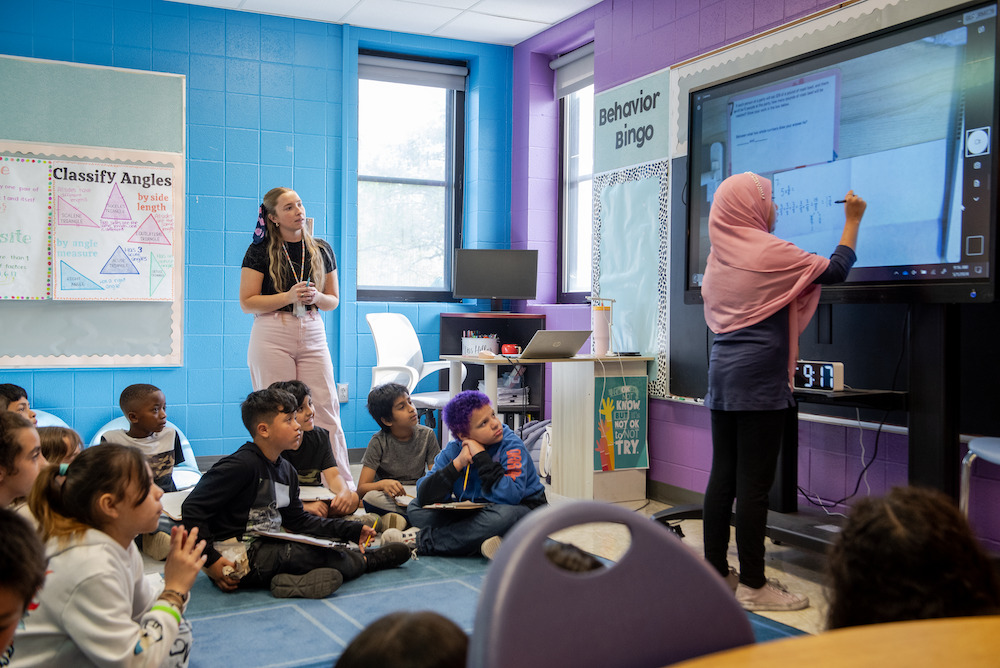Our favorite content resources
We compiled a list of go-to instructional resources from our team and other trusted education organizations. These free, practical tools help school and system leaders strengthen ELA, math, and science instruction—from planning and coaching to implementing meaningful learning experiences in the classroom.
To get started, browse the full list below or skip straight to the resources for your content area:

ELA
Academic Word Finder
This online tool from Student Achievement Partners can identify the high-value Tier II vocabulary in any text.
Assessing ELA Curriculum Shifts: A Practical Guide for Measurement and Progress Monitoring
This website and workbook from the Research Partnership for Professional Learning provide practical tools to track progress and improve outcomes during ELA curriculum shifts.
Early Literacy Playbook
The Instruction Partners early literacy team developed step-by-step guidance and customizable tools for strengthening and monitoring early literacy across a school system.
Take me there
ELA Professional Learning Tools
These ready-to-use tools and protocols are designed to help instructional leaders support stronger coaching and collaborative planning for ELA teachers.
International Literacy Association (ILA) Resource Page
ILA works to enhance literacy instruction through research and professional development.
Professional Knowledge for the Teaching of Writing
This position paper from the National Council for Teachers of English presents some of the principles that guide the effective teaching of writing.
Reading as Liberation
Student Achievement Partners compiled research on personalized learning and literacy—including researched-based operating principles for creating or adopting personalized learning strategies.

Math
Coherence Map
The coherence map from Student Achievement Partners illustrates how math standards are related and includes a sample task for each standard.
Take me there
How to Help Students Build Deep Understanding of Math Concepts
This blog post from Great Minds explores two common barriers that prevent students from developing a strong foundation of conceptual knowledge in math.
Math Professional Learning Tools
These ready-to-use tools and protocols are designed to help instructional leaders support stronger coaching and collaborative planning for math teachers.
Mini-assessments
These assessments from Student Achievement Partners are designed to illustrate the math shifts and expectations of college- and career-ready standards.
Most Misunderstood Math Standards
This blog series from Student Achievement Partners takes a close look at commonly misunderstood math standards for grades 1–8. Strong lesson internalization of high-quality instructional materials can proactively address these common misconceptions.
Priority Instructional Content in Mathematics
Student Achievement Partners identified the most critical content within K–12 math standards. Though initially created to support educators during the disruptions of the 2020–21 school year, this resource still offers valuable insights for prioritizing lessons and setting pacing guidance.
Selecting and Sequencing Student Solutions
This white paper from Curriculum Associates presents best practices for fostering rich student discussions in math classrooms.
YouCubed
YouCubed presents student tasks, professional development, and growth mindset research.

Science
A Framework for K–12 Science Education
This is the National Research Council’s evidence-based foundation that was used to develop the Next Generation Science Standards (NGSS).
Demystifying Phenomena-driven Science Instruction
In this blog, the Instruction Partners science team provides a brief overview of the role of phenomena in science classrooms—along with free resources to help your team strengthen science teaching and learning.
Next Generation Science Storylines
These tools can support science teachers in developing, adapting, and teaching with strongly aligned NGSS (or similar standards) materials.
OpenSciEd Curriculum Units
These elementary, middle, and high school units are aligned to the NGSS and are released and published individually after undergoing field testing.
Phenomena Teaching and Learning
This resource describes how phenomena can be used in classrooms with NGSS and similar science standards to drive teaching and learning.
Solidify Science Leadership
The Instruction Partners science team created this detailed workbook to help school and system leaders establish and progress toward a vision for high-quality science instruction.
Translating the NGSS Into Instruction and Classroom Assessment
The American Museum of Natural History offers tools and training for the implementation of the NGSS and similar science standards with a focus on unit and assessment design.
Resources for supporting multilingual learners
Strong content instruction and academic language instruction should go hand-in-hand. In addition to the resources above, we’ve compiled resources that offer content-specific strategies to support the language demands of grade-level content—so that multilingual learners (along with all students learning academic language) can learn and thrive.
me
there